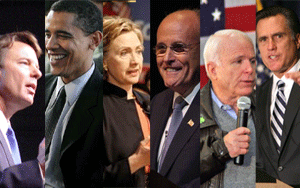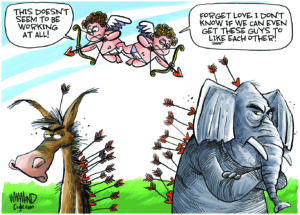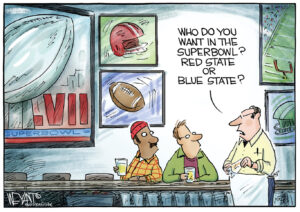A Political Bridge for 2008
Steve Kornacki, community outreach director of Unity08, the online independent party, speaks with Truthdig about his organization's vision for a third way in the coming election, why our political system is broken and how he intends to fix it.
Steve Kornacki, community outreach director of Unity08, the online independent party, speaks with Truthdig about his organization’s vision for a third way in the coming election, why our political system is broken and how he intends to fix it.
Click here to listen to this and other interviews.
Transcript:
James Harris:
This is Truthdig. James Harris sitting down with the esteemed Josh Scheer, and on the phone we have Steve Kornacki. He’s the community outreach director for Unity08. It’s a new political party, and it is their hope that they can bridge Republican and Democratic ideals. I know you [readers] may think it’s a far-fetched effort. Steve, tell me about what you guys are trying to accomplish over at Unity08.
Steve Kornacki: It’s a collaboration between veterans of two different parties and from sort of a different era of American politics. Doug Bailey is a Republican. Sort of an old-school Republican, in the sense that he, you’d call him a moderate Republican. He … worked for Gerald Ford. That was probably his most prominent campaign experience. He teamed up with Hamilton Jordan, who was Jimmy Carter’s chief of staff, sort of the architect of the Carter presidential campaign in ’76, and Jerry Rafshoon, who was Jimmy Carter’s … communications director during that ’76 campaign. So you have three people, and two were on Carter’s side in ’76 and one of them was on [President] Ford’s side in ’76. And yet they’ve come together in the year 2008 to sort of say there was an era in American politics when we could have our differences. We could even campaign against each other but at the end of the day we were able to sort of seek out the common ground that existed, to not make politics overly personal. This sort of, you know, personal-combat nature of politics that’s taken hold in the last 25 years wasn’t so prominent back then. It didn’t affect them even though they ran against each other.
And you’re looking at a 2008 election that’s coming up and what they [Bailey, Jordan and Rafshoon] saw and what I think a lot of people are seeing is that this country has been — and you can blame anybody you want, Democrats can blame Republicans, and Republicans can blame Democrats. In the 1990s, it’s fair to say the Republicans were out to get Bill Clinton. Whether you think they were right or wrong, they were out to get him, and in this decade the Democrats have been out to get George W. Bush. And again, whether you think they’re right or wrong, that’s been what has defined and dominated our politics, and in the meantime the Democratic Party gets so defined by what it’s against and the Republican Party gets so defined by what it’s against, you forget that there are a lot of good people in both of these parties that have a lot of similar values, a lot of similar concerns. And they are completely relegated to the sidelines of most debates in Congress, most debates in Washington, D.C., these days.
So our conclusion, Doug and Jerry and Hamilton, and then my conclusion in joining in with them, and I hope the conclusion of a lot of other people, is that the kind of common ground, the kind of unity, the kind of common-sense government that we seek, really isn’t going to come in the year 2008 from either one of these political parties. It’s got to come from a new movement, and that’s what Unity08 is. The idea is that around this time next year the two parties will nominate candidates who — we don’t know who they’ll be, but if past is prologue most Americans will be looking for a third choice because neither party will nominate somebody who is that inspiring. Both parties will nominate someone who is more beholden to the hard-core element of his or her party. So we’re going spend the year building a vehicle so that this time a year from now a third choice can emerge, and the one condition that we set is the third choice needs to be bipartisan. One Democrat, one Republican, on a ticket, either order. And that’s the concept of Unity08.
Josh Scheer: Is this a centrist party?
Kornacki: I don’t like that term because we’re sort of, when you say centrist you’re sort of buying into the terminology of the D.C. consultant world. That’s the wrong way of putting it. You’re defining left and right, the way it’s defined in our combat politics these days. You’re defining left and right pretty much according to wedge issues, and what we’re saying is we reject the left and right definitions that exist because we reject the issues they’re based on. They’re mostly based on issues that have very little to do with the average person’s daily life. Gay marriage is a great example, abortion is a great example. We have invested so much of our politics and geared so much of our politics towards wedge social issues that pit people against each other, that get people to the polls. I mean, goodness, we saw this in 2004. This president may very well owe his reelection to the use of a particularly ugly wedge issue, and our point is, we’re not trying to get into the middle of that, we’re just trying to reject that altogether.
We’re trying to talk about issues. We’re trying to create a vehicle where it’s safe for candidates to talk about and address, head-on, issues that neither party really wants to address. Social Security is a great issue; the national debt’s a great example. My God, it was considered a scandal in 1992 that our national debt had creeped up to $4 trillion. Folks, we’re two years away from $10 trillion, and that’s being piled on the next generation. It used to be, it went without saying that every generation’s responsibility in this country was to leave it better off for the next generation, and yet nobody in Congress even seems to think about that, in either party. We just passed the, my God, Iraq spending bill that’s going through right now and, again, let’s take the Iraq question out of it, which, I know that’s sort of a ridiculous statement, but a question of war and peace should be decided on the basis of war and peace. And what has the Congress done? They’ve gone and inserted pork into the bill to entice support in the House and the Senate to pass the bill. Shame on them for doing that, shame on the congressmen who went along with it, and shame on the president who now suddenly decides to develop a conscience on that issue and says, oh, I’m going to veto this because of the pork, when he’s been only too happy to sign bills from the Republican Congress for the last six years that have taken that national debt and brought it to the verge of $10 trillion. Shame on all of them. Nobody seems to care about that issue.
And that’s just one example of what I think Unity08 can address. And if you want to call that left, right or center, you can call it whatever you want but we call it ignored. And that’s our idea. Put some sunlight on it.
Scheer: I understand where you’re coming from, and maybe centrist is the wrong term, but when you get a left-wing Democrat who wants healthcare for all and the government should pay for it, and then you get someone on the right who’s saying, no, we can’t pay for it because we’re going to creep up that national debt, you guys aren’t, you don’t pick those kind of sides. You’re trying to find a middle ground between behavioralists and structuralists.
Kornacki: Absolutely. Healthcare’s a great example because the debate has sort of stalled in Washington. Clinton brought it — well, hell, Harry Truman in his first address after WWII to the Congress asking them to pass a universal healthcare bill. That was, quick math here, 62 years ago. But, Clinton sort of brought it to the fore in the early ’90s. The Republicans killed it, and we haven’t really had a serious healthcare discussion in Washington, D.C., since then, but you know what’s happened, if you look around the country, a lot of state legislatures, which are far less polarized on partisan grounds and ideological grounds, have sort of taken the initiative and you’ve found interesting alliances, interesting coalitions being built between the parties, between the contrasting ideologies. Massachusetts is a pretty good example of this. You’re probably seeing some of the stories now, a year ago, they passed what is pretty close to a universal healthcare bill in that state. You had a Republican governor, Mitt Romney, signing it. And you had a legislature that’s 87 percent Democratic. Perhaps the most Democratic legislature in the country, that sort of crafted the legislation and passed it. There’s some disputes around the margins there, and some of the Democrats felt Romney vetoed a few things in there because of his presidential ambitions and trying to play to the right and all that. But, Massachusetts is just one example. A lot of states are taking the initiative on this now, and we’re saying, my God, if the state legislatures are capable of coming together and actually keeping their eye on the ball and, that is, getting healthcare to people who need it, why can’t the Congress? What’s the excuse of the Congress?Scheer: Now, in doing some of my research, I found names like Al Gore, Michael Bloomberg and others to be possible presidential candidates. Have you guys picked a candidate? Is there a voting process? Who’s going to be your running mate? Because Al Gore is a big name. Michael Bloomberg is a big name. They seem to fit your platform. Which guy do you think is going to be [part of] your running team?
Kornacki: Well, if either one of them were interested, they’re certainly welcome to pursue it. I know Bloomberg could certainly relieve the fundraising pressure right away. The principle behind this is actually, this sort of gets into our concerns about the nominating process with each party. What’s going to happen next year in the Democratic and Republican primaries? You’re going to have a very sort of unrepresentative pool of voters in Iowa, New Hampshire, possibly Nevada, possibly South Carolina, who are going to whittle each party’s field to maybe two or three candidates, maybe less, maybe they’ll even get a winner of those four. And then you’re going to have this super huge collection of states on Feb. 5th, 2008, and then you’re going to have the nominee. Most people, most good Democrats, most good Republicans across the country are really going to have nothing to say about who their party nominates [are] unless they can write a big check next year. So we’re saying we’re going to nominate our candidate a few months after both parties nominate theirs. In June 2008 we’ll nominate ours, and we’re going to do it through what we think is the future of democracy — an online, the first online political convention. And we’re going to allow any registered voter in the United States of any political party, or any registered voter who’s not a member of a political party. A political independent, which might be the heart and soul of our movement. To register for our online convention, they can support a different candidate. They can go support Obama now, they can go support John McCain now. Doesn’t matter to us. We’re opening that to everybody. And they will select the nominee in a June 2008 online convention. And will select the ticket, I should say. If the candidate is interested in running, they can, that candidate can submit their name, along with a certain number of signatures, of our registered delegates, and can run in that convention, and that candidate could be drafted at that convention too, I should add. If some of our delegates decide that Bloomberg or decide that Gore or decide that Chuck Hagel or whoever — it could be anybody, we should stress. It should be the candidate, then those people can circulate petitions, and the only catch is that before the convention the candidate will have to at some point say, OK, if drafted, if nominated, I will run, and then that candidate’s name could be on the ballot, so I can’t give you names right now. …
Scheer: Yeah.
Kornacki: It’s wide open. And that’s the spirit of it.
Scheer: And now I really want to get on the Internet thing ’cause I was reading a [Washington] Post article from … 2006, when you guys first started. … You guys are really big on the Internet; how is that playing out for you? I mean, how have you found the Internet? Because, we see these other candidates now using the Internet. Do you feel like you may have a majority on the Internet? A monopoly?
Kornacki: Well, yeah. It’s interesting because in politics these days, you know, the Internet, everybody talks about Internet strategy and you think back to Howard Dean and all the money he raised on there, so everybody says, well, we’re going to start an Internet movement and we’re going to change politics completely through it. And that’s certainly our vision. I think it works, to different degrees and different ways for different campaigns. In our case, I think we, we’re not going to see a real massive visible ground swell for this for some time because we don’t have a personality behind our campaign right now. I mean, we have a great actor, Sam Waterston from TV, he’s on “Law & Order,” who’s sort of out there promoting us, which is great. He’s been fantastic, but presidential campaigns, especially this day and age, are driven by celebrity personality, at least in the early stages. You know, you’ve got Barack Obama, Hillary Clinton, Rudy Giuliani. They drive most of the interest in this race. People we’re talking to, the voters who aren’t really part of the party establishment on either side, aren’t particularly engaged right now. What we’re looking for is to have a vehicle available to them around this time next year, when they start to pay attention, when they have busy lives, they have a lot going on, you know, these concerns we’re talking about, whether it’s healthcare, or the economy, national debt. These affect them every day so they’re busy with their problems and all their concerns. But around this time next year, they start to pay attention. Our message is going to be pretty simple. C’mon over to Unity08.com, register as a delegate and that’ll take all of 45 seconds. You don’t have to change your political affiliation, your party affiliation to do it. And then in June of 2008 you get to vote at our convention and then no one’s going to have any excuse come October, November 2008, when we routinely complain that there’s not a third choice. Well, if you ever have had that complaint, here’s your chance to do something about it.
Scheer: Just for our listeners, I think Mark Cuban is also on your advisory council, right?
Kornacki: He is. He is. He came to us recently. We have a lot of interesting people on there and I think it’s really an eclectic mix and I think if you take a look at some of the names on there, it’s tough to really pigeon-hole us. That’s why I kind of reacted when you said centrist earlier. There are worse things to be called, I’m sure, but it’s a mix of all sorts of people with all sorts of different backgrounds and all sorts of different experiences in politics. But one thing that they all sort of have in common is that they’re frustrated. They’re frustrated that there’s a lot of hot air. There’s a lot of heated discussions. Very personal discussions. Very personal arguments and confrontations in politics. But not a lot seems to get done either.
Scheer: Now this is a really important thing I think we can wrap up on. I really want to get your take on this because in that ’06 article and a few others, they talk about your grass-roots support. And one site just said you don’t have any. What’s your grass-roots support like right now? Are you guys, do you feel you have like, in the communities, not through the Internet but, in phone banks, like the Republicans do, or raising money … ?
Kornacki: I think working is the key, and I think you’re not going to really see it take off until this time next year. I really do believe that. I think our challenge right now is creating enough interest in it, enough attention among the people who are likely to be interested in this kind of thing, who — you hear everybody complaining that, my God, it’s April 2007, we shouldn’t be talking about the presidential race in November 2008 right now. People who are complaining about that, with good reason I think, we have to convince them to be taking an active role to — first of all, we have to make sure we’re on their radar screen. And certainly appearances like this help. And then convince them to take an active role right now, even though it is so early. So, yeah, right now we have, I think, I don’t want to quote you a number here because I don’t have it in front of me, but I think we have around 50,000 people signed up online, which is, I know that’s not a huge number, I also know that if you add up the total number of delegates who are going to be at the Democratic and Republican convention next year you’re going to get about 10,000, by my count.
Scheer: They’ve been around a while.
Kornacki: What’s that?
Scheer: I said they’ve been around a while. They’ve been building their base. You guys still got one more, this next year, you guys will build and build and build and maybe you’ll be bigger than the Democrats.
Kornacki: That’s the idea. Look, if we have 50,000 now, and we can keep growing, I really believe, if we just do the grunt work for the next year and steadily make a name for ourselves and steadily spread the word, I really think a lot of people are going to wake up in February or March of 2008, take a look at the Democratic candidate, take a look at the Republican candidate, and it’s going to be just like, gosh, the last time we had an open-seat presidential election was 2000 right? And it was, if you can remember back to those primaries, it really came down to McCain versus Bush on the Republican side, [Bill] Bradley versus Gore on the Democratic side. And I think most, sort of, average Americans, if you asked them, well you know what, we’d like to have McCain versus Bradley. But they got Bush versus Gore. And obviously it turned into a very consequential election, but there weren’t too many people who were inspired by either choice in 2000.
So, if something like that happens again, all of those people who were disappointed with their choice in 2000 will be probably disappointed with what they’re presented with in 2008. The difference is, when they come to that realization, there’ll be an outlet for them. It won’t be too late for somebody else to step forward. And I think that’s when — we talk about the grass-roots nature of this thing — I think that’s when it’s really going to take hold. Scheer: Your website says some good things about lobbyists. I’ll let people read that, and I also want to say to our listeners and readers, about being a delegate … you don’t have to change your party to be a delegate of Unity08, right?
Kornacki: We are technically a third party in that, we’re going to be the, sort of the independent party in the 2008 election. But you don’t, there’s no registration, there’s no “you have to leave the Democratic Party.” In fact, if you’re, as I keep saying, if you’re a Barack Obama supporter, if you’re a Rudy Giuliani supporter now, whatever it is, go ahead. We say, go work your heart out for Barack, for Rudy, write them a check, go to New Hampshire and campaign for him. But if you want to sign off with Unity08 too, you’re welcome to, and if things don’t work out well with you, you’ve got a home with us.
Harris: So it’s more of a fallback. Is it a fallback or do you hope to influence a great number of people and get a president in office?
Kornacki: It could be. But I think part of what we’re driven by, we’re driven by both optimism and cynicism at the same time. Optimism in the sense that we think this can be accomplished and it should be accomplished. Cynicism in the sense that the opportunity is going to be there because past history suggests that both of these parties are going to nominate people that just don’t resonate with the broad electorate in this county. But if one of the parties, maybe it’s one of the candidates who’s out there now and maybe it’s a candidate who nobody’s seen or heard from too much at least, but if one or both of these parties goes and nominates somebody who really clicks with the American public and address the concerns that we’ve outline how politics is conducted in this country and the issue that are being ignored, and talks about embracing kindhearted people on the other side of the political aisle.
If one of those candidates emerges from one of the parties, then there’s also the situation where we’re content to hear from them, say, OK, declare a victory and go enjoy a baseball season and go and cheer for that candidate . Sadly though, we’re starting this now because, in our lifetime, not many of us can remember too many examples when that’s happened, and it seems more impossible now than ever that these parties are going to get it together.
Harris: You may end up taking votes from a party that’s trying to get their guy in office. If Democrats want a Democrat to win, say Obama, Republicans are rooting for Giuliani, and you take a crucial percentage, have you done a disservice?
Kornacki: The [Ralph] Nader question hangs heavy over any third party. I think my answer to that would be, there is the Nader example that’s out there. …
Scheer: And [Ross] Perot, too.
Kornacki: … I don’t believe that if you look back at the numbers from ’92 Perot actually tilted it [the election], and I think … the 20 percent that he got came from people who wanted change and I think it came from Clinton as much as from Democrats, and Democrat-leaning independents, than it did from Republicans, but I think the Perot example is very instructive because he could have won the race. If you remember the chronology … [in] February of 1992 and by May or June he was polling at 35 percent to 40 percent in a three-way race with Clinton and [George H.W.] Bush and winning a majority in early projections of the electoral college and he had the money to run a campaign every bit as well financed as Clinton and Bush. And what happened with Perot, frankly, is he went a little crazy, and when he dropped out of the race in July 1992 all of it raised a whole series of questions about his temperament and about his fitness for office. And when he got back in, he was not seen as quite the same threat, and even at that, he was able to poll 20 percent . So we think if Perot, for all of his issues, could lead the race in the spring of 1992, if you can nominate somebody who has broad appeal, that’s the idea here.
We’re talking about appealing to the tens of millions of Americans who’ve been ignored by the political process. You nominate somebody who has broad appeal — there’s some question of whether Ralph Nader had broad appeal — and somebody who’s well financed, and if we can build the kind of grass-roots support we want to build, then we can make sure that person and that candidate is well financed, then there’s no reason our candidate can’t get to October and be at 20-25 percent in the polls. And if you’re 20-25 percent in the polls, then you get in the debates. And if you get in the debates, we’ll stack the ideas, the vision, the type of discussion that we’re calling for, we’ll stack that up against the candidates of the … Democratic and Republican Party, and I think at that point we’d feel pretty good about our chances and it wouldn’t be about spoiling it. It would be about winning.
Scheer: And, you know, I want to say something about the Perot campaign. I liked Adm. [James] Stockdale, the vice presidential candidate, and I thought that he may not have done well at the vice presidential debates, but I really like him and he actually made me kind of sway toward Perot. …
Harris: It was “you people.” Remember [Perot’s] “you people” comments?
Kornacki: Yeah, I remember both of those. I liked Stockdale. You know, I’m one of the 2 percent of the people after that debate that said he won it actually, the vice presidential — .
Scheer: Well, up against Dan Quayle and Al Gore, there’s not much competition but. …
Kornacki: He came across as a natural. I mean that’s what you need in politics.
Harris: Hillary’s raised $26 million. Barack’s raised $25 million and we haven’t even talked about the Republican Mitt Romney… you guys don’t even have a candidate yet. So, are you just a madman to your friends? How does everyone receive you?
Kornacki: It takes … some explanation at this point. I won’t lie to you … the money can be formidable, but as I said, we believe that if we can build the grass-roots army that we believe we can build, and we can put up candidates who people could actually believe in and would actually want to vote for, then it wouldn’t be an unreasonable proposition to ask the grass-roots supporters to put up 20 bucks each, to put up 30 bucks, 10 bucks, whatever they can afford. And build a sustainable base of financial support for a fall campaign. At that point, if we have enough money to be competitive, it doesn’t mean we have to spend as much. I mean I can cite … many examples in American politics where [the candidates] don’t have any ideas, they have no personality and they have no ability to inspire and all the money in the world’s not going to buy an election if that’s the case. I mean, go back to, some random examples. Phil [Gramm], running for president in 1995. How many millions did he raise? I don’t even think he made the New Hampshire primary. A classic example is John Connally from Texas. All these guys from Texas. He raised millions of dollars in 1980. I think he got one delegate at the convention. So, no, we don’t need to raise, and we’re not going to raise, I don’t think the hundreds of millions that Hillary might or Romney or whatever. But if we raise enough to get our message out there, at a certain point I think our message is worth a good chuck of change.
Harris: Well, Steve Kornacki, community outreach director for Unity08, you better drink lots of Gatorade, and keep your stamina up ’cause you’ve got a lot of work ahead of yourself. …
Kornacki: That’s good advice. Well, thanks for the time, guys.
Harris: No problem, and we look forward to hearing more from you over the coming year, and we’ll see how it plays out in the coming presidential election. For Steve Kornacki, for Josh Scheer, this is James Harris and this is Truthdig.
Your support matters…Independent journalism is under threat and overshadowed by heavily funded mainstream media.
You can help level the playing field. Become a member.
Your tax-deductible contribution keeps us digging beneath the headlines to give you thought-provoking, investigative reporting and analysis that unearths what's really happening- without compromise.
Give today to support our courageous, independent journalists.






You need to be a supporter to comment.
There are currently no responses to this article.
Be the first to respond.